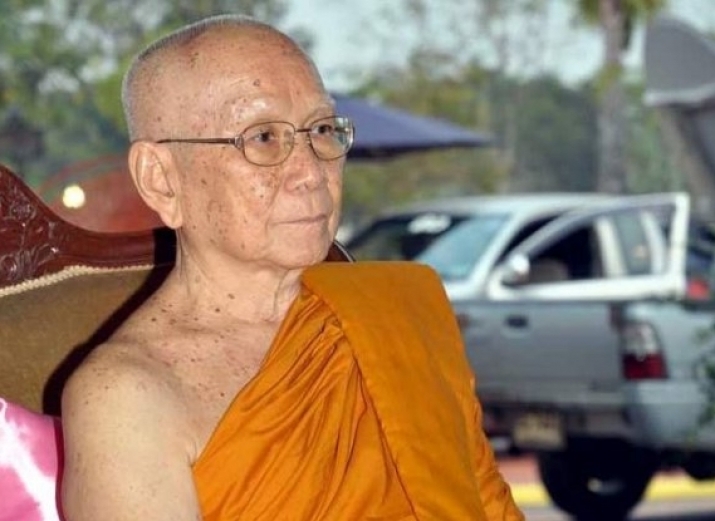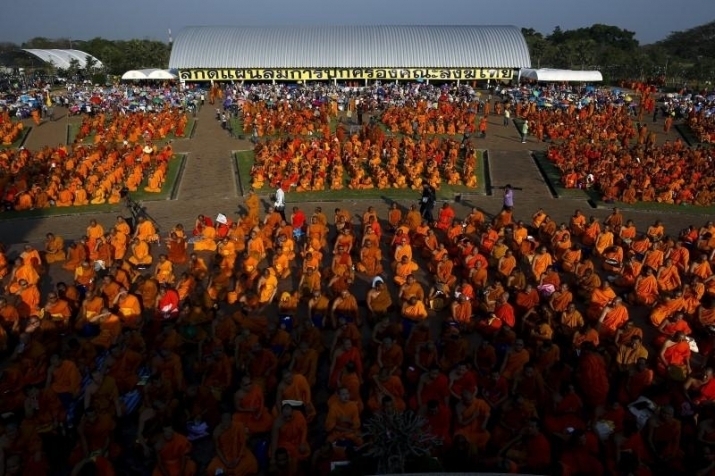NEWS
Thailand Appoints New Supreme Patriarch to Head Monastic Sangha
 Venerable Somdet Phra Maha Muneewonga has been appointed Thailand’s new supreme patriarch. From nationmultimedia.com
Venerable Somdet Phra Maha Muneewonga has been appointed Thailand’s new supreme patriarch. From nationmultimedia.comThailand’s King Maha Vajiralongkorn has appointed Venerable Somdet Phra Maha Muneewonga as the new supreme patriarch, filling the top spot in the Southeast Asian kingdom’s monastic sangha for the first time since the previous office holder passed away in October 2013. A formal appointment ceremony presided over by the king will be held on 12 February at Bankok’s Wat Phra Si Rattana Satsadaram, also known as the Temple of the Emerald Buddha.
The supreme patriarch—the full title is Somdet Phra Sangharaja Sakalamahasanghaparinayaka—is the head of the Thai monastic sangha and president ex officio of the Supreme Sangha Council, the administrative body that governs the Thai sangha. The supreme patriarch oversees both of Thailand’s Theravada orders, the Maha Nikaya and the Thammayut Nikaya, as well as the country’s small minority of Mahayana Buddhists.
Born in 1927, Ven. Somdet Phra Maha Muneewonga, the abbot of Bangkok’s Wat Ratchabophit and a member of the Sangha Supreme Council, ordained as a novice at the age of 10. After completing his monastic education, he recieved full ordination in 1948. In 1957, he graduated with a bachelor’s degree in religious studies from Mahamakut Buddhist University, then studied for a master’s degree in history and archaeology at Banaras Hindu University in India. He was awarded an honorary doctorate degree by Mahamakut Buddhist University in 2009, and in 2010 received an honoroary doctorate degree from Mahachulalongkornrajavidyalaya University.
Thailand’s highest ecclesiastical position had remained vacant since the passing at the age of 100 of His Holiness Somdet Phra Nyanasamvara Suvaddhana Mahathera, who had held the position of supreme patriarch since being appointed by Thailand’s last King Bhumibol (r. 1946–2016) in 1989. The late Buddhist leader was also the adviser and guardian of the late king when the latter was ordained as a monk in 1956, and of the current king, who was ordained in 1978. Somdej Phra Nyanasamvara died on 24 October in 2013. He had been hospitalized for more than a decade before his death.
 Monks and their supporters rally to protest perceived government interference in religious affairs in February last year. From reuters.com
Monks and their supporters rally to protest perceived government interference in religious affairs in February last year. From reuters.comThe selection process for the new supreme patriarch was marked by rivalries, controversy, and disputes between the major monastic orders and within the government. In February last year, monks and army personnel clashed during a protest rally attended by thousands of monks against perceived interference in the appointment of the supreme patriarch and in a show of support for the then frontrunner for the position, Ven. Somdet Phra Maha Ratcha Mangkhlachan. However, vocal critics expressed doubts about his suitability for the role. He was accused of violating monastic rules and of having close ties with the abbot of Wat Dhammakaya, the temple at the center of the controversial Dhammakaya Buddhist movement in Thailand, which is reportedly backed by a number of powerful public figures—including the family of ousted prime minister Thaksin Shinawatra—and has been hounded by allegations of involvement in fraud, embezzlement, and corruption.
In January this year, Thailand’s parliament passed a bill empowering the kingdom’s new monarch to appoint the supreme patriarch. The bill, passed by the military-appointed National Legislative Assembly (NLA) on 29 December last year, gives the king the right to nominate the head of the highest ecclesiastical position in the country's monastic order, restoring a tradition that was abolished in 1992. Section 7 of the amended Sangha Act now states that the king reserves the right to appoint a successor if the supreme patriarch passes away or is unable to perform his duties, and that the prime minister may nominate the candidate to be appointed. Prime Minister Prayut Chan-o-cha is reported to have nominated five senior monks for the king’s final decision.
Thailand is a predominantly Buddhist country, with 93.2 per cent of the nation’s population of 69 million identifying as Buddhists, according to 2010 data from the Washington, DC-based Pew Research Center. The country has approximately 38,000 temples and some 300,000 monks. Although full bhikkhuni ordination is not recognized in Thailand, communities of female renunciants, some of whom have been ordained overseas, exist, but do not enjoy the same level of societal acceptance as their male counterparts.
See more
Somdet Phra Maha Muneewong appointed new supreme patriarch (The Nation)
Somdet Phra Maha Muniwong new Supreme Patriarch (The Bangkok Post)
Related news from Buddhistdoor Global
Ven. Prayudh Payutto Bestowed Somdej Rank in Thai Supreme Sangha Council
Sangha Wars: Conflict between Dhammakaya and Buddhist Establishment Spills over into Thai Politics
Thai Monks Tussle with Soldiers at Monastic Leadership Rally
Thailand’s Monastic Sangha Riven over Nomination of Supreme Patriarch
Thailand Pays Last Respects to Supreme Patriarch
Related features from Buddhistdoor Global
Buddhistdoor View: Rooting Out the Rot—Removing Corruption and Complacency in the Sangha
Exploring the Shared Buddhist Roots of Sri Lanka and Thailand














